Australian Prime Minister Anthony Albanese wins a second 3-year term

Australian Prime Minister Anthony Albanese made history by securing a second consecutive term in office, becoming the first prime minister in 21 years to achieve this feat. In his victory speech, Albanese emphasized the importance of facing global challenges in the Australian way, prioritizing unity and progress for the future.
Albanese’s Labor Party differentiated itself from the opposition, led by Peter Dutton, by avoiding emulation of US President Donald Trump’s administration. The Liberal Party was accused of mirroring Trump’s policies, which ultimately led to their defeat in the election. Dutton, who had held his parliamentary seat for 24 years, admitted defeat as Labor secured a majority in the House of Representatives.
The debate over utilizing beach cabanas at a popular travel destination sparked controversy, prompting Albanese to weigh in on the issue. The election result was a significant win for Labor, with Albanese’s leadership garnering praise from US Secretary of State Marco Rubio and British Prime Minister Keir Starmer.
Energy policy and inflation were key issues in the campaign, with both parties acknowledging the country’s cost of living crisis. While Labor focused on sustainable energy sources, Dutton proposed nuclear power as a solution to reduce electricity costs. Labor criticized Dutton’s plan to build government-funded nuclear generators, highlighting the impact on public services and job cuts.
The election campaign also saw echoes of Trump’s influence, with opposition senator Jacinta Nampijnpa Price drawing comparisons to the former US president. Price’s remarks regarding making Australia great again were met with scrutiny, as she distanced herself from Trump’s governance style. The focus on Trump in the campaign overshadowed critical issues such as food insecurity and economic uncertainty.
Foodbank Australia reported a significant number of households experiencing food insecurity, highlighting the pressing need for government intervention. The central bank’s decision to lower interest rates reflected efforts to stimulate investment and address financial challenges exacerbated by global economic conditions.
As Albanese prepares for his second term in office, the focus remains on addressing pressing issues such as energy policy, inflation, and public service reforms. The election outcome signifies a shift towards sustainable and inclusive governance, setting the stage for continued progress and unity in Australia’s political landscape.




